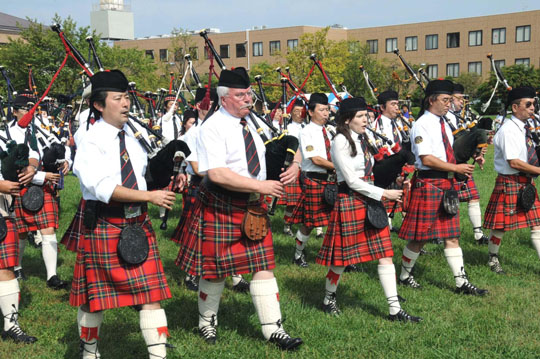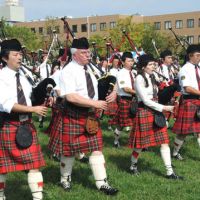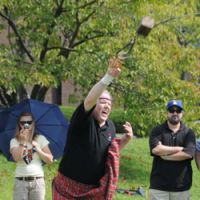Idle dog-walkers and shoppers around JR Makuhari Station were met with an unusual spectacle one sunny Sunday morning earlier this month. A large-framed blond man in a kilt sauntered past the shopping complex; then a group of Japanese women adorned in checked sashes came skipping along the intersection. The breeze brought a faint smell of haggis, followed by the unmistakable sound of bagpipes.
For this day marked the start of the 27th annual Scottish Highland Games, giving birth to a microcosm of Scottish culture in Chiba Prefecture, a lively celebration of traditional dancing, merrymaking and sports.
"So many Japanese like Scottish whisky and dancing, we wanted to bring a little piece of Scotland here once a year," said Philip Gibb,"chieftain" of the nonprofit St. Andrew Society of Yokohama and Tokyo, who organized the Oct. 4 event.
About 1,100 people attended, either to watch or to take part in traditional highland and country dancing contests, piping, drumming performances, tests of strength and soccer matches — and to sample haggis, the well-known Scottish dish made from minced mutton and sheep offal.
The games, held on the grounds of Kanda University of International Studies, brought in professional judges from Scotland, and was attended by as many Japanese as non-Japanese.
Even before the games were officially declared open at noon, dancers clad in traditional costumes drew in early arrivals while nearby, nervous bagpipers tuned up for their solo performances.
While most of the dancers were Japanese, hailing from the Tokyo Scottish Bluebell Club, the pipers came from several countries, including Japan, New Zealand and England.
Atsushi Yamane, pipe major of the Tokyo Pipe Band, looked on intently as members of his group took turns playing three-minute stints, marching slowly back and forth in front of the judge.
"They're really nervous, it's the biggest event of the year for them," said Yamane, who led marches throughout the day.
The pipers practice once every week or two, sometimes in office parking lots because of the noise they make. The hardest part of mastering the bagpipe is the breathing because you have to balance the melody and harmony, Yamane explained.
For 19-year-old Aya Matsumoto, the trickiest part of piping lies in the deft finger work.
"It's also difficult to make sure there is expression in the music," said Matsumoto, who studies English at university.
"I started learning the bagpipes from an early age when my uncle and aunt took me to see performances, and now I try to practice every day at home using a silencer," she added.
Bagpipes, thought to date back to about 100 A.D., consist of a bag made from sheep or deer skin and five wooden pipes: one for blowing, another for playing the melody and the remaining three for producing the instrument's distinctive drone.
While the dancing and bagpipes paint a picture of color and grace, the muscle-flexing competitors in the sporting events displayed a different kind of Scottish flair as they threw hammers, logs and stones, the grunts and cries of their exertions delighting the spectators.
"I was completely bowled over by the heavy events," said a company employee in her 20s named Yoko. This was her first Highland Games, having been brought along by a friend.
"I had the image of kilts and dancing when I thought of Scotland, but I didn't know this was also part of their tradition. I think these men are very powerful and it's fun to watch."
Some contestants flipped a caber, a 6-meter log, end over end, while others threw metal weights attached to a chain and a ring, or hiked a 25.4-kg weight between their legs — American football-style — and over a bar using one hand.
The traditional sports were the highlight of the day for David Fitton, minister at the British Embassy in Tokyo, who officially opened the games.
"I'm looking forward to the caber, because you don't even really get to see it in England," he said, adding that he was impressed with the large field provided by Kanda University for the events.
Highland events are held every week from May to October throughout Scotland, but they represent just a fraction of celebrations held by patriotic Scots worldwide, according to Gibb.
"There are 660 (games) in the world, and only 200 are in Scotland," said Gibb, who is also vice president of the British Chamber of Commerce in Japan.
"The Scottish are proud people at the best of times, but nothing pleases us more than to put on a great day for people," he added with a grin.
This year, the games also welcomed current haggis-eating world champion Pete Hart, who had just recently set a record by eating 450 grams of haggis in 53 seconds.
In addition to the traditional contests, there was a sack race and tug of war for the kids.
There was also plenty of traditional Scottish fare on hand, including haggis, Scottish smoked salmon, whiskies and ales, as well as fish and chips, pasties and pies, provided by corporate sponsors including familiar names like the Hobgoblin pub chain and British Hills, a theme park in Fukushima Prefecture that re-creates a medieval British town.
"I enjoyed the dancing, and ate sausage and onion. I also bought a handmade bracelet from one of the stalls," said a 7-year-old visitor, who had come along with her English father. This was the family's fourth time at the event.
"It seems very well-organized this year, I'm enjoying it very much," said the girl's father.
St. Andrew Society of Yokohama and Tokyo hosts other events throughout the year, including a Burns Supper and a Christmas party. For more information, visit the Web site at www.st-andrews-society.com






